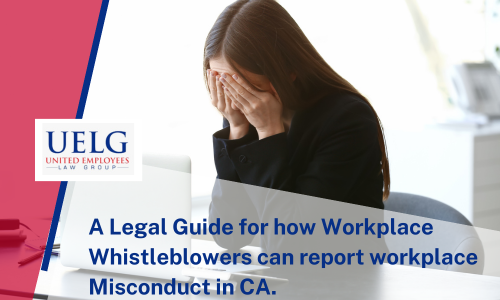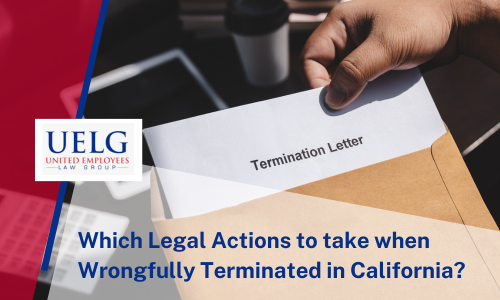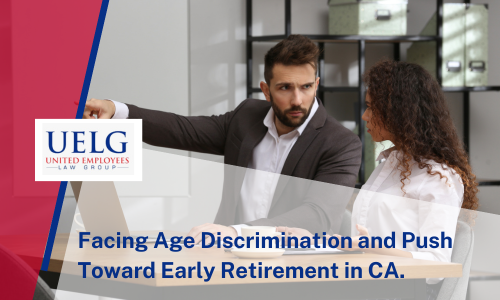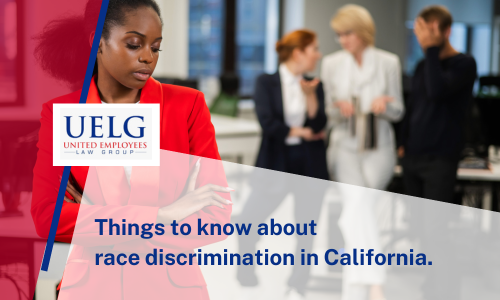California workplaces are not immune from the plague of racial discrimination. Race discrimination hurts workers’ morale, output, and general well-being. Serving as lighthouses, California’s Civil Rights Department (CRD) (formerly the DFEH) and the federal Equal Employment Opportunity Commission (EEOC) provide support in addressing and lessening the severe effects of racialized job discrimination. By fostering awareness and enforcing regulations, the CRD and EEOC are pivotal in promoting equal opportunities and dismantling barriers in the professional landscape. You can get more information and knowledge about employment race discrimination today by talking to knowledgeable and skilled legal personnel at the UELG law firm.
Which legislative acts prohibit employment discrimination based on race in California?
At the forefront of combatting racial discrimination at work are the California Fair Employment and Housing Act (FEHA) (codified in California Government Code §§12900 – 12996), and the federal Title VII of the Civil Rights Act of 1964 (embodied in 42 U.S.C. §§2000e, et seq.). These vital anti-discrimination laws are legislative bastions which rigorously bar employment discrimination based on race, and empower individuals to assert their rights and seek justice and protection against civil rights violations. In cultivating an inclusive atmosphere, California’s FEHA and the federal Title VII celebrate diversity, emphatically opposing discrimination in an effort to create workplaces that reflect the principles of fairness, equity, and respect for all.
Information about the prevalence of, and damages and other remedies recoverable in, employment discrimination claims.
Statistics gathered by the CRD and EEOC about complaints filed for discrimination in employment, housing and public accommodations reveal the prevalence of workplace race discrimination. According to 2019 data provided by California’s CRD, 6,029 right-to-sue complaints were filed with the DFEH, and of those 1,639 complaints were acted upon; and out of those the DFEH settled 710 cases (many of which were race discrimination cases) for a monetary recovery of $14,834,753.25. In 2020, 5,915 right-to-sue complaints were filed with the CRD, and of those, 1,548 complaints were acted upon; and out of those the DFEH settled 706 cases (many of which were race discrimination cases) for a monetary recovery of $11,176,865.59. According to data provided by the federal EEOC, in 2020 there were 22,064 workplace discrimination charges submitted; and of all the civil rights discrimination cases the EEOC handled (some of which were employment race discrimination) the EEOC secured a $439.2 million monetary recovery.
Generally, remedies generally available under the FEHA and Title VII laws include the following:
- Monetary Damages: In cases of race discrimination at work, monetary damages encompass compensation for tangible financial losses endured by the victim. These may include past and future lost wages (which may include lost earnings, bonuses, or other benefits); damages for other financial setbacks resulting from discriminatory actions within the workplace; emotional distress; and attorneys’ fees and costs. The goal is to help ensure that victims are fairly reimbursed for the financial setbacks incurred and stress resulting from the employment discrimination.
- Equitable Remedies: Equitable remedies in race discrimination cases involve non-monetary resolutions. This may include reinstatement of the affected individual to their previous position, implementation of policy changes to address systemic issues, or the provision of other injunctive relief (i.e., a court order requiring that the employer take or stop an action) to rectify discriminatory practices within the workplace.
- Punitive Damages: Punitive damages serve to discourage employers from objectionable conduct that disregards the rights or safety of workers. Punitive damages extend beyond compensation, and seek to penalize and deter discriminatory practices. Awarded in egregious cases, they are designed to send a clear message that society will not tolerate workplace discrimination, fostering a deterrent against future transgressions.
Common questions about race discrimination in California workplaces that can be answered by an experienced employment attorney:
An experience employment attorney can answer these questions that will help California employees obtain knowledge about how to protect their rights against race discrimination in the workplace:
- How can I prove race discrimination in the workplace?
- What California and federal laws protect employees from racial discrimination in California?
- What constitutes racial harassment in the workplace?
- Can I file a race discrimination claim if I face racial profiling at work?
- What steps should I take if I experience race-based employment discrimination?
- Are there examples of questions about discrimination during job interviews?
- How do the CRD and EEOC handle race discrimination complaints?
- Can an employer be held accountable for racial discrimination by employees?
- How do I calculate monetary damages in a race discrimination claim?
The experienced attorneys at UELG can help you find answers to these questions.
See: https://calcivilrights.ca.gov/wp-content/uploads/sites/32/2020/10/DFEH_2019AnnualReport.pdf.
See: https://calcivilrights.ca.gov/wp-content/uploads/sites/32/2022/01/2020-DFEH-Annual-Report.pdf.
See: https://www.eeoc.gov/newsroom/eeoc-releases-fiscal-year-2020-enforcement-and-litigation-data.
Do you have questions about employer racial discrimination? Ask the attorneys at UELG.
Curious about employment race discrimination? Our seasoned attorneys are here to address your concerns and guide you through the nuances of workplace racial discrimination. Understanding your rights and available legal avenues is paramount, and our skilled, knowledgeable and experienced legal team is ready to provide clarity and support. Don’t let discrimination go unchallenged—ask us anything, and let’s work together to strive for and help ensure a workplace free from racial bias.
Conclusion
As UELG’s lawyers navigate the complex terrain of race discrimination and California and federal laws prohibiting workplace discrimination in California, let’s collectively stand against injustice. Empower yourself with knowledge, hold employers accountable, and foster workplaces that champion diversity. If you’ve encountered discrimination, reach out to UELG for support. Together, we can build a future where equality reigns and every California employee enjoys the right to work without fear of discrimination. Take the first step toward justice and contact UELG with your questions—you and other California employees deserve to have a workplace free from racial discrimination.












